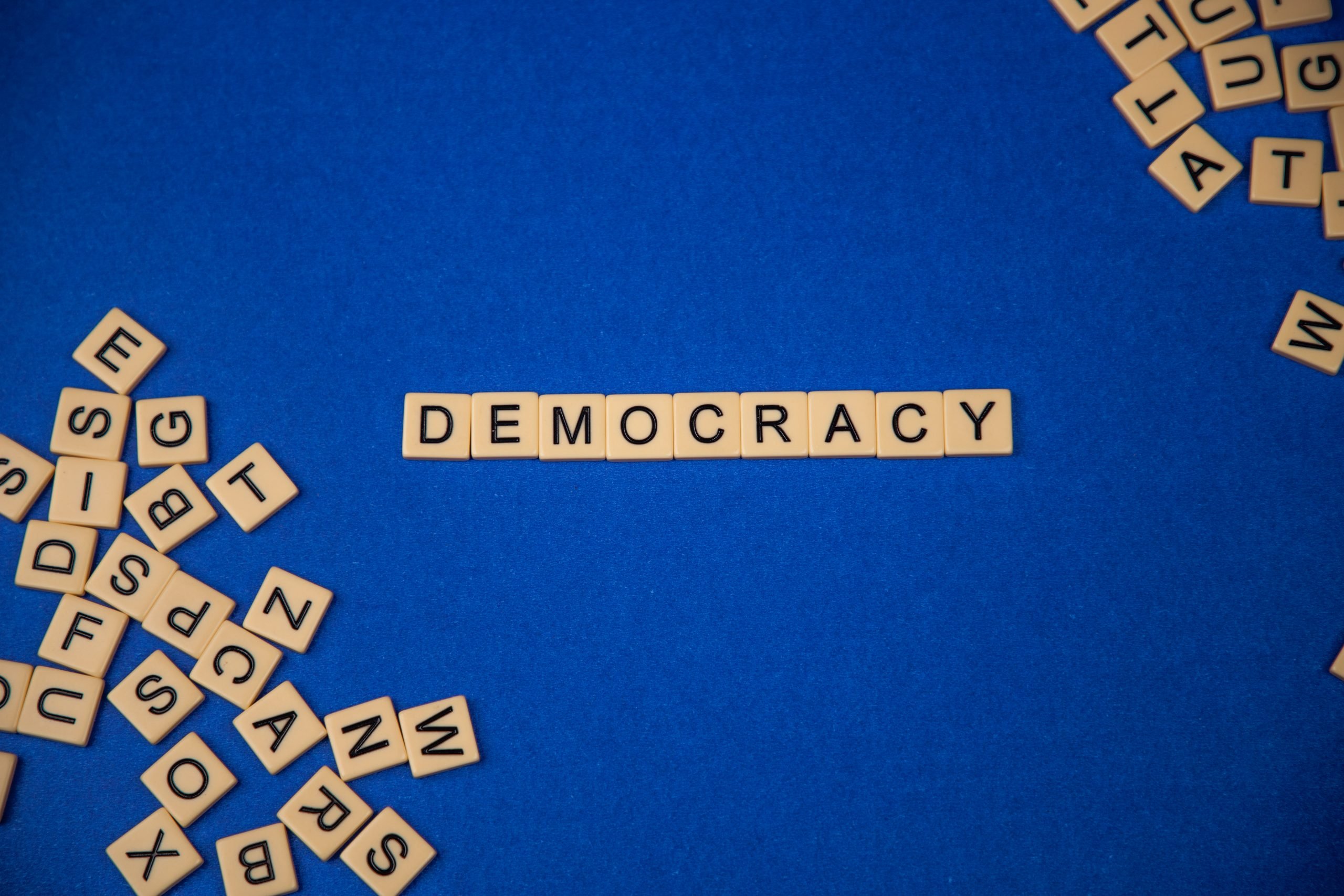Biden and the future of democracies

By Adrià Fortet
13/03/2021
Authors: Miquel Gil and Adrià Fortet
Pictures coming out of Capitol Hill during its assault on January 6 had a profound effect on American and international public opinions. To some, the assault on the seat of Congress was the culmination of an authoritarian escalation tied to the person of then-President Donald Trump, a quasi-fascist strongman who, according to this view, had subverted American democracy and replaced democratic politics with a personality cult, truth with lies and fantasy. Others saw in Trump a mere symptom and accelerator of a dynamic of polarization in American society which long predates his presidency, beginning with the end of the post-New Deal technocratic consensus during the 60s and 70s and its substitution by a politics of tribalism and identity. To the latter observers, the assault on the Capitol was but the most recent episode of a long process of degradation of the American public space. In any case, analysts of all persuasions agreed the Trump presidency’s convulsed end constituted an opportunity for the forces of the international liberal order to recover bipartisan consensuses within the country and democratic alliances throughout the world at a moment when the democratic bloc was disaggregating, some of its members’ systems of liberties were degrading and authoritarian regimes were on the rise.
It doesn’t seem this opportunity will be missed. Joe Biden was inaugurated as President fourteen days after the assault on the Capitol with rare bipartisan support in this time of great polarization. Ten Republican representatives and seven Republican senators voted, respectively, for Trump’s impeachment and removal from office; some important conservative analysts, such as former National Security Advisor John Bolton and the intellectual Robert Kagan, expressed their trust in the new administration’s unifying potential. Even those who, like Yascha Mounk, see the international arena as a hostile environment where the democratic bloc must reinforce internally to avoid having its members’ systems of liberties degraded, agree the United States will have a benign influence on it for the next four years, in spite of their doubts as to whether it will be sufficient to revert current tendencies.
The formalist menace and the United States
There is, however, a grave risk that the events at the Capitol pose for an effective defense of democracy. This risk is, paradoxically, that democracy’s defenders might entrench themselves behind a formalist notion of democracy which will hollow it out and expel important segments of the population from it. Awareness that the liberal order is in danger pushes some of its defenders to adopt drastic measures to reinforce it, such as censorship of social media, banning of political parties, and the expansion of criminal punishments for hate speech. Such behavior doesn’t differ much from the sort of measures and justifications the very authoritarian leaderships they are meant to fend off use to gradually degrade civil liberties. Liberty, as David Hume said, is seldom lost all at once. Such a drift, engendered by a besieged-citadel mentality, would probably entail the criminalization of any form of disruptive or radical protest and, protected by the limitation of civil liberties brought about by the coronavirus crisis, would spawn a new form of authoritarianism, one which would entrench itself behind procedure, formal rules and democratic rhetoric to, in fact, ossify existing power relations and keep the system impermeable to demands for change. Also, such a drift in the countries with the most solid tradition of liberal democracy would enable regimes of a more dubious democratic nature and their dominant segments to claim respectability and justify their repression of dissidents.
Notwithstanding, the aforementioned risk is somewhat diminished by the very nature of the political system of the main actor within the bloc of democratic countries. The United States has a solid political tradition of trust in liberal values and individual liberties, as well as belief in the country’s exceptionalism. The American political system has had the potential to incorporate citizen demands throughout its history, regardless of whether these demands were in line with the original text of the Constitution. This is shown by the incorporation of the Bill of Rights to the states, the adoption of female suffrage, and the end of racial segregation. In spite of fears expressed recently regarding the possible appearance of a new cycle of civil confrontation or an increasingly restrictive interpretation of civil liberties by the powers that be, American history shows institutions have had a high capacity for adaptation and broad segments of both parties approve of it. Only the question of the abolition of slavery truly brought the American system to the brink, the inclusion of other principles into the American legal and political framework has been accompanied by an undeniable amount of violence but this has not been an impediment for the underlying demands to be acknowledged as just and reasonable. Popular agitation by the Black Lives Matter movement during the last months is a case in point.
Two irreconcilable conceptions of democracy
The American system’s integrative tradition regarding popular demands significantly limits the risk that the defense of the system could degenerate into authoritarianism within the country and, by extension, it also limits the possibility that a reductionist and formalist conception of democracy could consolidate within the democratic bloc as a whole, one criminalizing without qualifications or exceptions any anti-status quo, contrarian or even violent movement in any country which has previously been categorized as democratic. Notwithstanding, the fracas at the Capitol might facilitate that formally democratic regimes with an authoritarian bent find complicity for their repressive methods in places where they previously did not and this might help them normalize their immobilist discourse, both internally and internationally. At the same time, increased understanding for repressive methods by leading democracies will only accelerate backsliding in democracies with a shakier liberal tradition, because the latter are susceptible to default to their original authoritarian form if circumstances allow for it. This tendency is even more pronounced in those cases that cannot actually be considered full democracies because, despite having a structure of government that formally complies with the basic parameters, maintain a political culture and a state apparatus with an authoritarian matrix onto which democratic procedures have been added that only affect it superficially and have not modified its essence.
What we are dealing with here is a clash between two different conceptions of liberal democracy, the result of which will have a profound impact on international relations for the next decades. One conception is formalist, fossilized, where legal mechanisms are used to protect the existing regime and distribution of power (the real constitution) from citizen demands, where decisions by the competent body and formal correction of procedures (or the interpretation bodies without a superior authority make thereof) come before any objective reading of legal texts, any notion of justice or any democratic principle. The other conception of democracy is dynamic, renovating, where the system is adapted to changing circumstances to protect individual rights and integrate the will of the people, with the belief that liberalism, as stated by Ramsay Muir, is a state of mind, not a rigid body of doctrine. It is predictable this clash will be resolved across the pond in favor of the latter conception, whereas in the Old World the fight will be much closer and the formalist conception will probably receive the support of countries with a traditional inclination towards authoritarianism.
In the Spanish case, the choice has already been made very decisively for the formalist and inflexible conception of democracy. Since the crisis provoked by the partial suspension and rewriting of the Catalan Statute of Autonomy by the Spanish Constitutional Court in 2010 systemic degradation has been the clear dynamic. Refusal by political parties of the Castilian national majority to answer the demands by the Catalan independence movement with a democratic vote; reinterpretation of existing laws to deem such a vote illegal; refusal to change these laws; constant usurpation of legislative and executive powers by the judiciary to limit the powers of the Catalan administration; increasingly creative interpretation of criminal justice legislation to repress the Catalan independence movement and other dissident groups; and the monarchy’s position-taking in favor of the status quo are all elements which have expelled millions of people from the system, have significantly reduced its legitimacy and have gravely impaired its functioning. This dynamic of systemic closing-off and degradation is not a new feature in the Spanish case and is closely linked to its lack of a genuinely democratic political culture. Generally, this attitude’s main consequence has been, around the world, the implosion of the existing political arrangement. If the current Constitution of the United States was ratified in 1788 and has been amended twenty-seven times to adapt it to social demands, Spain has had more than ten different constitutional regimes during the same period.
Conclusions
It is difficult to predict at this time what specific and palpable manifestations of the dispute between the two understandings of liberal democracy, formalist and substantive, there will be during the next months and years. Results will be significantly conditioned by variables such as the overcoming of the present health crisis, the new American administration’s degree of involvement in the protection of democracies, its degree of success in articulating a coherent foreign policy, and the level of resistance to centrifugal tendencies the Brussels political and bureaucratic apparatus will be able to put up. It is evident, though, that in any case the liberal order cannot be preserved through the medium of a formalist structure aping authoritarian measures and transforming state institutions into a mere bulwark against citizen demands. This formalism diminishes a government’s legitimacy both before its own citizenry and in international diplomacy: Germany and France will find it difficult to question Erdogan’s or Putin’s rights violations as long as they continue abetting similar measures within the European framework, be they the product of strongman populism of the Hungarian sort or that of a systemic oligarchy in the Spanish vein. The recent humiliation of Josep Borrell by Sergey Lavrov regarding Catalan political prisoners is the most recent example of this dynamic and adds to a list of cases including the failure to stabilize Ukraine and the massive arrival of Syrian refugees.
Catalonia has a special interest in defending and sustaining a substantive and integrative interpretation of liberal democracy, both because it coincides with its own political culture and because of the current power dynamics. The substantive conception is the one that will allow it to defend its national rights and citizen demands of self-determination in the current international situation. It is important to keep this in mind in the coming times, not only because this distinguishes Catalonia favorably from Spain’s choice for formalism and crack-down, but also as a political strategy to incline governing European bodies towards this direction. Or, if this proved to be impossible, as an alternative proposal to the European project, one with Atlantic support and that of the liberal democracies with the most solid traditions in our own continent.
Miquel Gil is a political scientist and has a master’s degree in political philosophy. He specializes in the intellectual production of nationalism and language policy.
Àdria Fortet is a historian and works as a researcher at the Universitat Autònoma de Barcelona, specializing in international relations and the Middle East. Currently, he’s working on a Ph.D. thesis studying territorial perspectives of the revisionist Israeli right.
The opinions expressed in this publication are those of the authors. They do not purport to reflect the opinions or views of the CGI or its contributors. The designations employed in this publication and the presentation of material therein do not imply the expression of any opinion whatsoever on the part of the CGI concerning the legal status of any country, area or territory or of its authorities, or concerning the delimitation of its frontiers.


